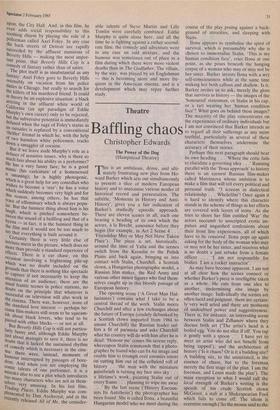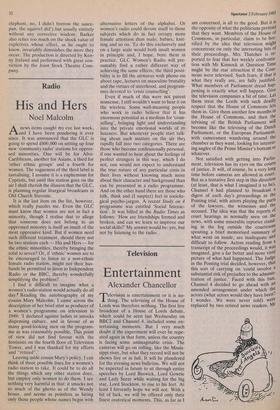Theatre
Baffling chaos •
Christopher Edwards
The Power of the Dog (Hampstead Theatre) This is • an ambitious, dense, and ulti- mately frustrating new play from Ho- ward Barker which sets out simultaneously to present a slice of modern European history and to anatomise various modes of historical record and presentation. The subtitle, 'Moments in History and Anti- History', gives you a fair indication of Barker's studiedly episodic approach. There are eleven scenes in all, each one bearing a heading of its own which the actors, a la Brecht, announce before they begin (for example, in Act 2 Scene 4 . . . 'Friendship May or May Not Have Taken Place'). The piece is set, historically, around the time of Yalta and the scenes switch from the Kremlin to the Polish Plains and back again, bringing us into contact with Stalin, Churchill, a Scottish clown, a Hungarian photographic model, a Russian film maker, the Red Army and various other minor figures who find them- selves caught up in this bloody passage of European history.
The opening scene CA Great Man Hal- lucinates') contains what I take to be a central thread of the work. Stalin meets Churchill and after a few exchanges about the future of Europe (crudely debunked by a Scottish clown imported from 1984 to amuse Churchill) the Russian leader suf- fers a fit of paranoia and asks Churchill what his country will do with him after he is dead: 'Honour me' comes the serene reply,
whereupon Stalin commands that a photo- grapher be found who can fix his image and
enable him to triumph over enemies intent on cutting him out of the celluloid roll of history . :the man with the miniature paintbrush is turning my face into sky . . .
a lifetime's work, painting Stalin out of every frame . . . planning to wipe me away . . .' By the last scene ('History Encoun- ters Its Antithesis') the photographer has been found. She is called Ilona, a beautiful Hungarian model who we meet during the course of the play posing against a back- ground of atrocities, and sleeping with Nazis.
Ilona appears to symbolise the spirit of survival, which is presumably why she is chosen to immortalise Stalin. 'This is my human condition face', cries Ilona at one point, as she poses beneath the hanging corpse of a woman who may or may not be her sister. Barker invests Ilona with a .wry self-consciousness while at the same time making her both callous and shallow. Is it, Barker invites us to ask, merely the gloss that survives in history — the images of the 'honoured' statesman, or Stalin in his cap, or a tart wearing her 'human condition face'? What goes on behind these images? The majority of the play concentrates on the experiences of ordinary individuals but I am not convinced that Barker intends us to regard all their sufferings as any more truthful, particularly as several of these characters themselves undermine the accuracy of their stories.
Perhaps this next paragraph should bear its own heading . . . 'Where the critic fails to elucidate a governing idea. . .' Running parallel with the 'Ilona approach' to history there is an earnest Russian film-maker called Matrimova whose ambition is to make a film that will tell every political and personal truth. '3 screens in dialectical relationshp . . . Wholefilm'! Once again it is hard to identify where this character stands in the scheme of things as her efforts are covered with layers of irony. As she tries to shoot her film entitled 'War' the actors succumb to unscripted erotic im- pulses and anguished confessions about their front line experiences, all of which have to be censored. Ilona pops up again asking for the body of the woman who may or may not be her sister, and receives what is no doubt a just rebuke from a female officer . . . 'I am not responsible for bodies. I am a rocket instructor'.
As may have become apparent, I am not at all clear how the scenes connect or whether Barker's piece is intelligible taken as a whole. He cuts from one idea to another, undermining one image by another image. Individually the scenes are often lucid and poignant, there are certain- ly very well acted and there are moments of undoubted power and suggestiveness. There is, for instance, an interesting scene between Stalin and Zdhanov where they discuss both art (`The artist's head is a boiled egg. You do not slice if off. You tap it gently with a spoon . . . I have yet to meet an artist who did not benefit from being tapped'), and the architecture of history ('Is it chaos? Or is it a building site? A building site, to the uninitiated, is the essence of chaos, but to the foreman merely the first stage of the plan. I am the foreman, and Lenin made the plan'). The main exception to what I would call the local strength of Barker's writing is the speech of his crude Scottish clown McGroot, a stab at a Shakespearian Fool which fails to come off. The idiom is eccentric enough ('So the mouse said to the
elephant, no, I didn't borrow the sauce- pan, the squirrel did'), but usually entirely without any corrective wisdom. Barker also relies too much on the shock value of expletives whose effect, as he ought to know, invariably diminishes the more they occur. The production is directed by Ken- ny Ireland and performed with great con- viction by the Joint Stock Theatre Com- pany.











































 Previous page
Previous page